
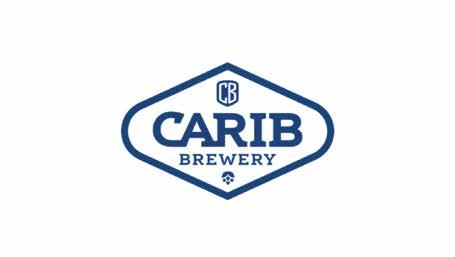
CARIB BREWERY (GRENADA) LIMITED Annual Rep or t 2023 OUR Planet OUR Progress OUR People

Annual Performance and Sustainability Report 2023

2x Growth 4 6 Pillars of Culture 7 Our Purpose, Our Vision 8 Sustainability Business Priorities 9 Core Values and Behaviours 10 ESG Environmental Social Governance 12 Chairman’s Message 14 Managing Director’s Message 18 Our Sustainability Report 27 Climate Change Mitigation and Adaptation 32 Resource Use and Circular Economy 33 Great Talent Resides Here… 35 Board Governance 37 Corporate Philanthropy Report 39 Corporate Information 43 Board of Directors 45 Executive Team 48 Corporate Information 49 Report of the Directors 50 Notice of Annual Meeting of Shareholders 52 Form of Proxy 53 Our Financial Highlights 2019 – 2023 56 Independent Auditor’s Report To The Shareholders of Carib Brewery (Grenada) Limited 58 Statement of Financial Position 61 Statement of Comprehensive Income 62 Statement of Changes In Equity 63 Statement of Cash Flows 64 Notes to the Financial Statements 65 Contents
At Carib Brewery (Grenada) Limited, we put people at the heart of all our activities. We understand that creating an environment in which our people can thrive is an essential component in driving long-term business success.



4




The Company’s culture has a huge impact on employee and customer retention, directly affects investor behaviour, and is ultimately a key driver to growth, profitability and long-term business success.
As we continue on our five-year journey towards 2X growth which involves acquiring new businesses and growing our portfolios across a number of key sectors, a great deal of work is going into the integration of the Company Culture and Sustainability practices, not just around the current business base, but also within newly acquired entities.
5

Empowering our people
6
R ecr u itin g and reta i ni n g the be s t

C o re value s
M ea ni n g a n d p u rpo se
6
PILLARS OF
CULTURE
E m pl oye e re c og n i ti on
C on nect io n an d c o m m u ni ty
O p p or t u n i tie s t o g row a nd d eve lo p
7
Through our Vision, Purpose and Sustainability Business Priorities , we provide our people with hope for the future and value for our customers and investors.
OUR
PURPOSE
Inspiring Better Choices for a Better World
OUR VISION
Refresh and Uplift Grenada With our Distinctive Beverages.

8
SUSTAINABILITY BUSINESS PRIORITIES
Impact Stewardship
– Knowing our impact
– Reducing adverse e ects
– Enhancing positive outcomes
Equality
– Promoting fairness
– Fostering inclusion
– Embracing diversity
Accountability
– Taking ownership
– Disclosing transparently
– Acting responsibly
ESG PILLARS

Environmental
– Climate change mitigation & adaptation
– Water and marine resources
– Resource use and circular economy
– Pollution reduction
– Biodiversity and ecosystems
People and Communities
– Boosting employee, customer and consumer well-being
– Creating access and opportunity
– Driving social advancement
Responsible Governance
– Engaging stakeholders
– Optimising risk
– Operating with ethics and integrity
Purposeful Investing
– Prioritising resource e ciency
– Intentional deployment of capital
– Accelerating Sustainable Development
Social
– Safe working
– Equal Opportunity
Governance
– Stakeholder Engagement & Advocacy
– Enterprise Risk Management
– Board Governance
– Public Policies
– Business Ethics and Integrity
– Employee, customer and consumer well-being
– Responsible Marketing & Innovation
– Education
9

CORE VALUES AND BEHAVIOURS
We consistently promote awareness and reinforce our Company Values and Behaviours through established employee recognition and engagement programmes. Our cultural journey is continually evolving and improving .
10
BEING UNSTOPPABLE

OWNING OUR MISSION
SHOWING RESPECT AND TRUST
CARING WITH PURPOSE
LOVING OUR CUSTOMERS
PLAYING HARD
WINNING TOGETHER
11

E SG
ENVIRONMENTAL SOCIAL GOVERNANCE
Highlighted are some of Carib Brewery (Grenada) Ltd’s progress in making our operations more Sustainable, in alignment with the United Nations Sustainable Development Goals.
RESPONSIBLE CONSUMPTION AND PRODUCTION
7 12 13 15
AFFORDABLE AND CLEAN ENERGY CLIMATE ACTION LIFE ON LAND
LIFE BELOW WATER 14
PARTNERSHIPS FOR THE GOALS 17
Investing in Green energy Carib Brewery (Grenada) Ltd. will be investing in green (solar) energy in 2024, which will generate 240 kW of renewable energy.
Circular economy
Continued production in returnable bottles and crates which when no longer usable is returned to the supplier for recycling.
Reduce impact on the landfill as a result of donation of spent malt grain from the brewing process to local farmers as a low-cost additive to supplement animal feed.
12
5
8 GENDER EQUALITY

9
DECENT WORK AND ECONOMIC GROWTH INDUSTRY INNOVATION AND INFRASTRUCTURE
Safe Working
Between 2022 and 2023 there was a 55% reduction in accidents, which can be attributed to the defensive driving training held in October 2022, for drivers of both light and heavy-weight vehicles, as well as forklift operators. Additionally, all staff personnel completed the Safe Systems of work training, contributing significantly to the reduction in accidents.
Enhanced Cybersecurity
The Company as part of The Ansa McAL Group advanced its threat detection and incident response capabilities in 2023. A Security Operations Centre (SOC) was established with 24/7 monitoring and remediation, coupled with full Security Orchestration, Automation, and Response (SOAR) capabilities.
Culture Transformation
Carib Brewery (Grenada) Limited as part of The ANSA McAL Group has embarked on culture transformation to meet the growth and sustainability goals we aspire to achieve. The Group is working to enhance our work environment and enriching our culture and work-life experiences for all.
12
RESPONSIBLE CONSUMPTION AND PRODUCTION
Enterprise Risk Management
16
PEACE, JUSTICE AND STRONG INSTITUTIONS
17
PARTNERSHIPS FOR THE GOALS
The ANSA McAL Playbook & Risk Standard was launched, which applies to Carib Brewery (Grenada) Ltd. The Standard defines the minimum requirements of its risk management processes for maximum effectiveness.
ESG Framework
ANSA McAL has commenced the development of the Group’s ESG framework, with the purpose of integrating sustainability into our corporate strategy and day to day business. Our culture transformation journey is continually evolving and improving. Carib Brewery (Grenada) Ltd has adopted said framework as part of the Ansa McAL group of companies.
13
CHAIRMAN’S MESSAGE
My deepest appreciation to the management and staff at all levels for their contributions, dedication, loyalty, and hard work. I am very confident that with their continuing commitment, perseverance, right attitude and teamwork, the company will be able to realize its Purpose, Vision and Core Values.
Anthony N. Sabga III CHAIRMAN

14

15
During 2023 Carib Brewery (Grenada) Limited remained resilient amidst a highly challenging and competitive business environment. Under the guidance of the Board and the leadership of senior management, we delivered a credible performance in the face of many challenges. Considering a contracting market, CBG delivered revenues of $71.2M revenue, up 1% on the previous year of $70.5M. While we remained profitable, our profit before tax (“PBT”) declined marginally to $11.19M compared to a PBT of $11.86M in FY2022. This decline in PBT resulted from the escalation of fuel prices, material and labour costs, cybersecurity, advertising and inventory provision costs.
We invested significantly in both CAPEX and OPEX with the installation of our new bottle washer, new sales trucks and overhauls of our equipment enabling us to work towards attaining FSSC22000 certification. Importantly,

as a Company we have remained focused on fulfilling our strategic goal of delivering sustained financial returns for shareholders and long-term stakeholder value. This strategy is designed to withstand the rigours of the industry while making positive contributions to society, the economy and the environment.

Rewarding Shareholders
The Board acknowledges that the dividends we distribute are important to all shareholders and we remain committed to delivering value. We have approved an ordinary final dividend of $0.98 for the year to December 2023, together with a special dividend of $0.52 per share which results in a total dividend of $1.50 per share, up on $1.00 from prior year.
Outlook
As we embark on a new year, we will continue to focus on capital investments, innovation, growth, and increasing value to our shareholders. As we navigate the path ahead, I am confident that our collective efforts will continue to drive success and create lasting value. The management will continue to
New sales truck
16
World Food Safety Day
exercise financial prudence and tighten operating costs to maximize shareholders’ value. We will continue to seek opportunities to drive our business forward with our diversified range of beverages and services by leveraging on our strong track record and capabilities that we have built over the years. We will continue to pursue value creation, business sustainability, and growth strategies.
Conclusion
On behalf of the Board, I wish to express my sincere appreciation to all our valued shareholders, customers and other stakeholders for their continued support and confidence in us. My deepest appreciation to the management and staff at all levels for their contributions, dedication, loyalty, and hard work. I am very
confident that with their continuing commitment, perseverance, right attitude and teamwork, the company will be able to realize its Vision, Mission, and Core Values. Finally, I wish to place on record my deepest gratitude to my fellow members of the Board for their immense contributions, wise counsel and confidence in the direction of the Company. With our strategic vision and brands, I remain confident in our strong ability to drive shareholder returns, and to continue to create sustainable long-term stakeholder value.
 Anthony N. Sabga III Chairman
Anthony N. Sabga III Chairman

17
New Bottle Washer
MANAGING DIRECTOR’S MESSAGE
As we navigate the path ahead, I am confident that our collective efforts will continue to drive success and create lasting value for our shareholders and stakeholders.
Ron Antoine MANAGING DIRECTOR
18

19
Introduction
In 2023, amidst a backdrop of global uncertainties on the macroeconomic and geopolitical fronts, Carib Brewery (Grenada) Limited (CBG) had a difficult year but persevered to work towards delivering maximum value to its stakeholders. Under the guidance of the Board and senior management, we delivered a stable financial performance; but importantly focused on Capex investments to better position the company for the future.
Company Performance
While 2023 held both opportunities and challenges, CBG registered marginal revenue growth but experienced a decline in profitability. This was primarily due to increases in general and administrative expenses. While these cost increases are concerning, they reflect our strategic investments in various areas of our business.
General and Administrative expenses also increased due to activities targeted at boosting our marketing efforts and enhancing our customer satisfaction with numerous sponsorships, installation of billboard, signs, investments to support our cybersecurity, digital transformation initiatives and enhancing operational agility. Significant investments were also made in repairing the distribution fleet to provide top-class service to all our valued customers.
As a result of the above, Carib Brewery (Grenada) Limited (CBG) saw profit before tax (“PBT”) decrease from $11.86M in 2022, to $11.19M in 2023. This despite a small increase in generated revenue to $71.15M, from $70.46M in the prior year. The revenue performance is encouraging and is a testament to the hard work and dedication of our sales teams and the strength of our customer relationships.
in Thousands in Eastern Caribbean Dollars
Though the performance above was not as envisioned, management’s focus will be to generate additional cost savings, drive operational efficiencies across our business, and
deliver sales and marketing initiatives to ensure growth and long-term value to all our shareholders.
56,000 58,000 60,000 62,000 64,000 66,000 68,000 70,000 72,000 8,000 10,000 12,000 14,000 Profit Before Taxation (PBT)* Sales Revenues* 2019 2020 2021 2022 2023 PBT EC$M Revenue EC$M *Expressed
20
(continued)
REVENUES
PERIOD
2023, WAS $71.2
.
FISC AL YEAR HIGHLIGHTS SHAREHOLDERS’ EQUITY $47.91M 2022: $44.4M EARNINGS PER SHARE $1.95 2022: $2.02 2022: $9.5M CAPEX $13.6M REVENUE $71.2M 2022: 70.3M PROFIT BEFORE TAX $11.19M 2022: $11.86M 21
FOR THE
ENDED 31ST DECEMBER
MILLION
MANAGING DIRECTOR’S MESS A G E


A key part of preparing for the future is our capital investment strategy. This strategy is guided by principles aimed at maximizing value creation and return on investment. Capital investments in our production facilities focused on increasing capacity, improving efficiency, and ensuring product quality and safety. As a result, we invested in upgrades to machinery, equipment, and manufacturing processes to optimize throughput combined with initiatives that enhance customer satisfaction, loyalty, and retention, ultimately driving revenue growth. We are committed to modernizing our technology infrastructure to support our digital transformation initiatives and enhance operational responsiveness. In support of this, $13.6M was spent on capital investment which included a new bottle washer, computer equipment, sales trucks, dual purpose vessels (DPV) and a new selling system.
Notwithstanding higher CAPEX and corporate income tax payments which resulted in increased cash outlay, cash balances remained healthy at $11.46M. The Company’s financial
New bottle washer
22
Installation of DPV


position at the end of FY2023 continued to be strong, with total assets standing at $65.85M. The Company regularly reviews all aspects of its capital structure with a focus on maximizing returns to shareholders and maintaining balance sheet strength and flexibility.
At CBG’s core lies a deep-rooted commitment to social responsibility. It also underlies our commitment towards making a meaningful difference, through the various social corporate investment initiatives we support, in our communities. Through our corporate social responsibility (CSR) programme, we continued to support local community initiatives


which creates opportunities for community development, along with cultural, sporting and educational opportunities through philanthropic endeavours, sponsorships and partnerships with many organizations and groups. CBG sponsored numerous sporting, cultural and educational events including the annual Inter-Secondary School Games (intercol), numerous football competitions including the Star Malt Secondary School Football competition, sailing festivals, carnival and other cultural events and educational scholarships through the TA Marryshow Community College. The Company provided numerous internship opportunities thus continuing to invest in the next generation of talent and building a brighter future for our country.
At CBG, we recognize our responsibility to operate sustainably and ethically, being cognizant of the impact of our actions on the environment, our communities, and our stakeholders. Our commitment to Environmental, Social and Governance (ESG) principles is integral to our business philosophy. As stewards of
Star Malt Secondary School Football competition
23
Vita Malt TAMCC Student Scholarships

the environment, we are dedicated to minimizing our ecological footprint and promoting sustainable practices throughout our operations. We strive to reduce energy consumption, conserve water resources, and minimize waste generation in our brewing processes. In support of this, we donate our by-product from the brewing process to local farmers to be used as animal feed, installed low energy lighting across our operations and continue to produce in returnable bottles and crates, which when no longer usable are crushed and returned to the manufacturer for recycling. This significantly reduces the negative effect on the landfills, waste disposal systems and the environment.
Strong corporate governance and effective risk management are fundamental to our company’s success and long-term sustainability. We adhere to the highest standards of governance practices, maintaining transparency, accountability, and integrity in all our dealings. Our Board of Directors is committed to upholding ethical principles and fostering a culture of compliance and ethical conduct
through the organization. We believe that robust governance frameworks are essential for safeguarding shareholders’ interest and building trust among stakeholders. Compliance with laws, regulations and industry standards is central to our organization with our compliance programs being designed to promote a culture of integrity and accountability throughout. While risk cannot be fully eliminated, our proactive approach enables us to navigate uncertainties with agility and resilience. CBG maintains rigorous risk management protocols which identify, assess and mitigate risk across our operations, enabling the company to navigate uncertainties with agility and strength.
Recognizing that our people are vital to our success, CBG fosters a workplace culture of collaboration and empowerment, while cultivating the importance of diversity, equity and inclusion. As we seek to build a high-performing team, CBG invested in continuous training and develop programs tailored to the needs of employees and the Company, equipping them with the knowledge, skills and capabilities required to adapt to evolving industry
24
On the job training
trends and to excel, thus adding value for all stakeholders. By investing in our people and building a culture of excellence, CBG is positioning itself for long-term success. In 2023, we provided training and development programs which introduced a significant level of transformation activities including the implementation of a selling system - Microsoft Dynamics and several initiatives to enhance our employee experience. Additionally, employees were trained in cybersecurity, quality systems, goals and objective settings, fire safety and defensive driving.
The well-being, health and safety, and engagement of our employees are paramount to our success, and we remain steadfast in our commitment to maintaining the highest standard of safety in all aspects of our operations. We prioritize initiatives that promote employee wellness and mental health: recognizing that a healthy and engaged workforce is essential for long-term success. Through rigorous safety training, robust safety protocols and the continued provision of health and safety equipment to all employees, we recognize the importance of health and safety. As a result of our focus on mental and emotional health, we have implemented initiatives to promote employee wellness including access to mental health resources through our Group’s employee assistance programs.
Looking Ahead
As we embark on a new year, we will focus on innovation, growth, and increasing value to our shareholders. We have identified key strategic priorities guiding our efforts in 2024 and beyond. We will continue to invest in plant and machinery while driving innovation across our product lines thus cementing our position as an industry leader. In line with this strategy, new product launches are carded for 2024.
In line with our environmental stewardship
thrust we will be investing in renewable energy and improving our recycling initiatives to minimize and mitigate our impact on the environment while promoting sustainable practices across our operations. While the road ahead may present challenges, we will overcome them and emerge stronger than ever. We are deeply committed to delivering sustainable long-term value for our shareholders, and I am confident that CBG has the resilience, adaptability, and strategies to achieve sustainable growth. We remain steadfast in our efforts to create a more sustainable future for our teams, our clients, our communities, as well as for the industry.
Conclusion
I extend my sincere gratitude to our employees, whose dedication, hard work, and resilience are the driving force of our business. I also express my appreciation to our esteemed shareholders and valued customers for their continued support and confidence. My sincere thanks to our Board members for their continued support and counsel. As we navigate the path ahead, I am confident that our collective efforts will continue to drive success and create lasting value for our shareholders and stakeholders. We have entered 2024 with renewed optimism and determination, trusting in our ability to develop solutions and deliver on our plans. While the macroeconomic and geopolitical environments are fluid, our business is well-positioned to move forward powerfully into the future.
Ron Antoine Managing Director
25

26

OUR Sustainability REPORT
27
CARIB BREWERY (GRENADA) LIMITED AS PART OF THE ANSA McAL GROUP IS IN TRANSFORMATION MODE AND IS BUILDING A SOLID FOUNDATION BASED ON DATA TO CHART THE WAY TOWARDS A SUSTAINABLE FUTURE.
Our Company recognises sustainability as “meeting the needs of the present without compromising the ability of future generations to meet their own needs,” as defined by the United Nations Brundtland Commission.

PROMOTION OF WELL-BEING OF ALL PEOPLE
DRIVING ECONOMIC AND SOCIAL FOR ALL PROSPERITY
SUSTAINABILITY
PRINCIPLES
PRESERVATION OF THE PLANET
FOSTERING OF HARMONIOUS AND INCLUSIVE SOCIETIES PEACEFUL
PARTNERSHIP
WITH STAKEHOLDERS FOR A UNIFIED APPROACH TO DEVELOPMENT
28
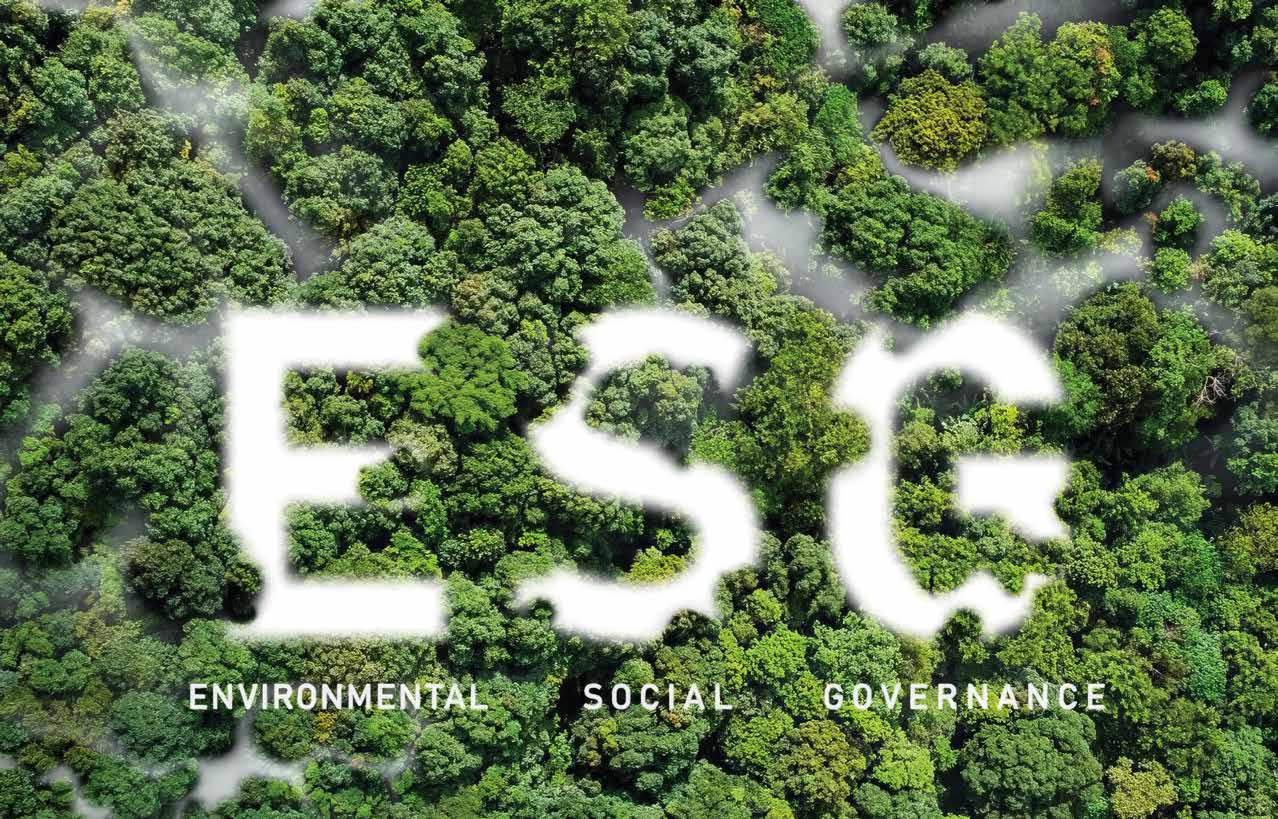
Carib Brewery (Grenada) Limited as part of The Ansa McAL Group recognises the importance of honouring these principles so that the interconnection between our business decisions, society and the natural environment can be responsibly managed.
Impact Stewardship
We have started the development of the Company’s Environmental, Social and Governance (ESG) Framework, the main objective of which is achieving a comprehensive understanding of the impact of the Company’s revenue generation on people and the planet, so that adverse effects can be reduced and positive outcomes enhanced.
Equality
Carib Brewery (Grenada) Limited supports equal employment opportunities. We prioritize diversity and inclusion in our workforce, recognizing that diversity is our strength, and we embrace the unique perspectives and experiences that each person brings to our team.
People and Communities
At Carib Brewery (Grenada) Limited we hold a unique perspective that sets us apart. We firmly believe that our people and teams are the driving force behind true progress and growth.
29
Responsible Governance
Responsible governance is a cornerstone of our organization’s commitment to transparency, accountability, and ethical conduct. We understand that effective governance is essential for building trust with stakeholders, mitigating risks, and ensuring long-term sustainability. We believe in the importance of diversity and independence in governance structures. Our board of directors is composed of individuals with diverse backgrounds, experiences, and perspectives, who bring valuable insights to decision-making processes. We also maintain a separation of powers between management and the board to ensure independent oversight and decision-making.
Purpose Investing, Climate Change Mitigation and Adaptation
During 2022 and 2023, Carib Brewery(Grenada) Limited has invested in a new beer filter and a new bottle washer both of which will have positive impact on the environment in terms of reduced water and chemical usage. This will be further strengthen with planned investment in renewable(Solar) energy in 2024.
30
ENVIRONMENT

“WE MUST RECOGNISE THAT THIS IS ONE PLANET AND WE ARE ALL JUST PASSING THROUGH. THE EFFECTS THAT WE CREATE AND THE POSSIBILITIES THAT WE LEAVE WILL BE RELIED ON FOR GENERATIONS TO COME.”
ANTHONY N. SABGA III
GROUP CHIEF EXECUTIVE OFFICER AND CHAIRMAN, BOARD OF DIRECTORS
CARIB BREWERY (GRENADA) LIMITED
Our environmental commitments are in support of the following seven United Nations sustainable development goals
51
Clean Water And Sanitation Affordable and Clean Energy Industry Innovation and Infrastructure Responsible Consumption and Production Climate Action Life on Land 6 7 9 12 13 15 14 Life Below Water
Climate Change Mitigation and Adaptation
Investing in Green and Renewable Energy
Carib Brewery (Grenada) Limited will be embracing renewable/solar energy with the installation of solar panels in 2024, which augments our position as a responsible manufacturer. This will have a positive effect on the environment through the reduction of greenhouse gas emissions which contributes to global warming.
Energy Efficiency
Carib Brewery (Grenada) Limited has replaced 80% of all lights with LEDs. These lights are energy efficient, have a long lifespan, durable and have minimal UV emissions.


Water-Efficient Brewing
Water is a key ingredient in the production of both alcoholic and non-alcoholic beverages at Carib Brewery (Grenada) Limited. In fact, water accounts for more than 90% of the volume in beer. Water is also essential for cooling processes and the extensive cleaning required to uphold the high hygiene standards in the food and beverage industry. Improving water use
efficiency, water conservation and management of wastewater are the three strategies the Beverage Sector is employing across the four breweries to achieve the objective of reduced water consumption.
In 2023 a new bottle washer was installed and the company is expected to utilize less water in the production process as a result.
ESG BEVERAGE Reduction in
consumption 32
water
Resource Use and Circular Economy
Reusing and Recycling Glass and Plastic
Carib Brewery (Grenada) Limited has a bottle and crate deposit program where customers are serviced directly with sales and returns. Recognizing the importance of sustainability and environmental responsibility, the Company has a radio campaign asking consumers to return bottles and crates while raising awareness about the benefits of reducing waste. These bottles and crates produced by Carib Glassworks Ltd and Ansa Polymer have been crafted with sustainability in mind and are built to withstand multiple uses and be washed and reused up to 11 times.
Upcycling Waste
At Carib Brewery(Grenada) Limited, spent grains from the brewing process are distributed to farmers as a low-cost additive to supplement animal feed. This initiative turns what would be a waste into a valuable resource. In 2023 442,248KG of spent grains were donated.
Increase primary packaging returns for reuse/recycling


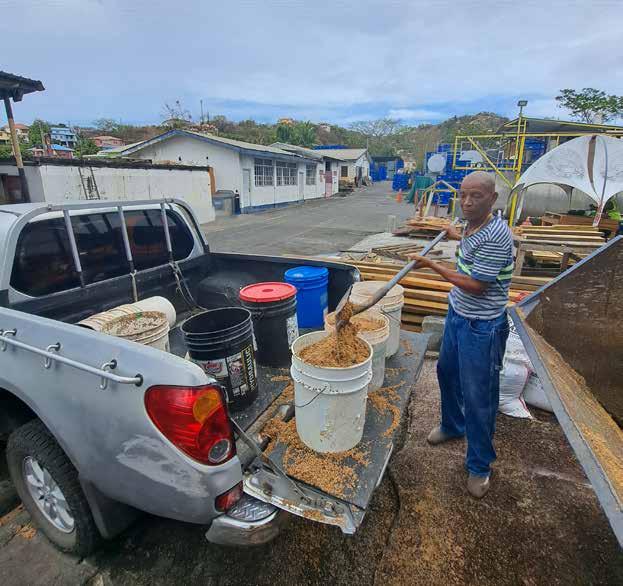
ESG BEVERAGE
33
Waste Reduction
The implementation in 2023 of a more sustainable beer filtration system, eliminates the need for material as a filtration media, reducing both raw materials required and waste generated from the filtration process.

Paperless Systems
The upgraded Payroll System and Employee Management System, have moved away from paper-based processes to an electronic system, saving paper used for HR approval processes, and printing of pay slips . This
Culture transformation
2023 marked the introduction of a comprehensive culture transformation with the participation of our personnel in the Group’s inaugural group-wide Culture Townhall which was conducted by the Group CEO.
transformation has led to the automation of manual processes, leading to greater efficiencies and empowerment of employees and managers.
Subsequently, our employees participated in culture transformation workshop facilitated by Ansa McAL personnel.
Responsible Marketing and Innovation
Carib Brewery (Grenada) Limited commitment to responsible drinking is evident in initiatives such as the integration of the “@ EASE, DRINK RESPONSIBLY” icon on the neck labels of all Carib Brewery-owned alcohol brands, merchandising and social platforms. This was fully implemented in 2023 and serves as a visual reminder to consumers to make responsible choices while consuming their favourite Carib product.
Responsible alcohol consumption: • Bottle package labelling
ESG
BEVERAGE
34
Great Talent Resides Here…
As the competitive landscape for talent continues to evolve, we are clear that we must prioritise the value our people bring to the table – their ambitions, strengths and unique skills – more than ever.




Our leaders welcome feedback, even the most challenging responses, with openness and receptiveness. Across the Company, progress was made in investing in our people – offering development programmes, physical, mental wellness and social activities.
SOME OF OUR ONGOING EFFORTS INCLUDE:

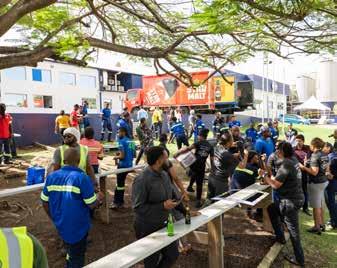
We are dedicated to fostering a dynamic and employee-focused culture as is evident in our inclusive approach to every staff member in the Company. Our commitment to prioritising our people remains unwavering.
Creating and maintaining a people-centric work environment – striving to cultivate a workplace culture that not only adapts to change but propels it forward.
Continuously promoting an inclusive and diverse team.
Encouraging greater camaraderie through engagement activities.
Prioritising the overall well-being of our employees, both mentally and physically, through our wellness and employee assistance programmes.
35

Our governance commitments are in support of the following four United Nations Sustainable Development Goals Responsible Consumption and Production Life on Land 12 15 Peace, Justice and Strong Institutions 16 Partnerships for the Goals 17
GOVERNANCE
Board Governance
Board Structure
Duties of the Board of Directors
The Board’s role is to oversee the Company’s Management and to ensure the long-term value of the Company for its shareholders. The Board recognizes that the long-term interests of shareholders is served by taking into
Audit Committee
The Audit Committee is responsible for assisting the Board in fulfilling its oversight responsibilities for the Financial Reporting process, the System of Internal Control over Financial Reporting, the Audit process, and the Company’s process for monitoring compliance with Laws and Regulations.
account the interests of all stakeholders starting with our employees, customers, suppliers and the communities in which the Company’s businesses operate.
This committee is charged with overseeing Managements enterprise risk policies and procedures and discussing the Company’s key risk exposures.
CBG BOARD AUDIT
COMMITTEE
37

38

CORPORATE Philanthropy REPORT
39
Corporate Philanthropy Report
At Carib Brewery (Grenada) Limited we believe that true success is measured not only by financial performance but also by the positive impact we make on society. This is demonstrated through our commitment to philanthropy and social responsibility which is deeply ingrained in our values and is reflected in our actions throughout the year.
During the past year, we continued to prioritize initiatives that aim to uplift communities. Through strategic partnerships and targeted
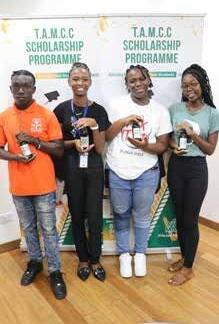

donations, we made meaningful contributions to various causes. From supporting education, sports, culture and community our philanthropic endeavours have touched many lives and communities.
As we reflect on our accomplishments and look ahead to the future, we are inspired by the collective power of giving and the profound impact it can have on individuals and society as a whole. We remain steadfast in our commitment to making a positive difference.




40






41

42

CORPORATE Information
43
Board of
ANTHONY N. SABGA III
GROUP CHIEF EXECUTIVE OFFICER, CHAIRMAN, BOARD OF DIRECTORS
CARIB BREWERY (GRENADA) LIMITED
MR. ANTHONY N. SABGA Ill holds the position of Group Chief Executive Officer (CEO) of ANSA McAL Limited and Chairman of the Board of Carib Brewery(Grenada) Limited.
Mr. Sabga holds a Bachelor of Science Degree in Economics from City University and a Masters in International Business Administration from Regents Business School, United Kingdom.

In 2001, Mr. Sabga started his early career at Trinidad Publishing Company (now known as Guardian Media Limited) as Promotions and Circulations Manager.
In 2003, he was appointed as the Executive at ANSA McAL’s Head Office with the focus on Strategic Development of the Group’s IT Infrastructure and the development and implementation of the Group’s Balanced Score Card and Strategic Management Frameworks. Mr. Sabga’s career included diverse portfolios as General Manager at Classic Motors and President of Carib Beer USA.
As Group CEO, Mr. Sabga is accountable for the leadership of the Group’s Executive Team in providing long-term strategic vision to maintain the Group’s competitiveness and sustainability, while expanding and diversifying the business portfolio and geographic reach to ensure the agility necessary to embrace and respond to the business opportunities in the region and globally.
PETER J. HALL
SECTOR HEAD - BEVERAGE/ DIRECTOR

MR. PETER J. HALL is the Sector Head – Beverage within the ANSA McAL Group of Companies. The Beverage Sector consists of four (4) owned and operated Breweries and an International (Export) business that develops the Carib® Brand in over 30 countries.
Prior to his current role, Peter was the President of Dean & DeLuca Consumer Brands, SVP Sales and Marketing for Heineken Americas, having joined Heineken in 2007. He also worked with Treasury Wine Estates (Beringer), Diageo and Marakon Associates. Peter holds a Bachelor’s Degree from the University of Melbourne, Australia and Master’s from Cambridge University, England.
44
Directors
MR. RON ANTOINE is currently the Managing Director of Carib Brewery (Grenada) Limited and has been for the past fourteen (14) years. Currently, he is also the Chairman of the Grenada Ports Authority.
Prior to Ron’s current role, he served as Chairman of both the National Insurance Board and Caribbean Brewers’ Association.
Ron is a member of both the CBA & MBAA, having joined in 2007 and also previously served as Chairman of the CBA.
Ron holds a Bachelor’s Degree in Mechanical Engineering from the University of the West Indies and a MBA in Accounting from Cornell University, USA.

MR. ANDREW J. BIERZYNSKI's business career began in Insurance, with now defunct Carib Insurance Co. Ltd. At age 21 he was appointed to the Board of Directors. As a result of the political environment in the 1970s he emigrated to pursue other opportunities and worked in the Health Food Industry.
Returning to Grenada in 1979 he worked in the Automotive Industry with J. B. Hubbards, and then with G. F. Huggins in Marketing. In 1985 joined Renwick Thompson & Co. Ltd and established Best of Grenada Ltd., his main occupations to today, where he is Director and Managing Director respectively.
He has served in many capacities viz. formally a Director of the National Commercial Bank, several of his own Companies covering a range of diverse interests in LPG Distribution, Agricultural Goods, Chemicals, Household Cleaners, Financial Services, Liquor/Wine Distribution, Real Estate Development, Hospitality Services. Currently serving as a Director of the Grenada Building & Loan Association. He holds interests in several other Public/Private Companies.
He was educated at the GBSS and Mapps College Barbados.
ANDREW J. BIERZYNSKI. CHAIRMAN OF AUDIT COMMITTEE/INDEPENDENT DIRECTOR

45
RON ANTOINE MANAGING DIRECTOR
Board of
ADRIAN SABGA
MANAGING DIRECTOR OF INTERNATIONAL AND BUSINESS DEVELOPMENT/ DIRECTOR

MARK
A. WILKIN DIRECTOR
MR. ADRIAN SABGA currently holds the position of Managing Director of International and Business Development at Carib Brewery (Grenada) Limited. He is charged with managing all export markets (currently 33 and growing) as well as managing all business development prospects which encompasses both organic and inorganic growth opportunities. Before this, he also led the innovation team and had the pleasure of launching some of Carib Breweries most exciting innovations like Carib Blue, Caribé, Hurricane Reef, and Rockstone to name a few.
Mr. Sabga holds a Master of Science, MSc–Management, Information System & Innovation from the London School of Economics and Political Science, and a BSc in Management and Economics from the University of West of England.

MR. MARK A. WILKIN is the Managing Director of Carib Brewery (St. Kitts and Nevis) Ltd. for the past 20 years. He also sits as a Non-Executive Director of S. L. Horsford and Co. Limited (A diversified trading Co) and a Director of St. Kitts Developments Limited (Land development Co). Prior to his current role, Mark was an Executive Director S. L. Horsford & Co Ltd, Basseterre, St Kitts.
Mark is currently Chairman of the Manufacturing Division of the St Kitts – Nevis Chamber of Industry and Commerce (SKNCIC). He was President of the SKNCIC from 2008 to 2010 and has served as a Chamber Director and Allied Director of St Kitts – Nevis Hotel and Tourism Association for many years.
Mark is a member of both the CBA and MBAA, having joined both in 2003. He also served as Chairman of the CBA in 2007/2008 and President of the MBAA in 2007 and 2017.
He holds a Bachelor’s Degree (BA) from the University of Western Ontario, Canada and a Master’s (MBA) from University of Keele, England.
46
Directors
MRS. ALDYN HENRY–BISHOP holds the position of Chief Financial Officer at Carib Brewery (Grenada) Limited with over 20 years experience in Finance and Accounting.
She holds a Bachelors of Science Degree (Hons.) in Management from the University of the West Indies, Cave Hill Campus, a Fellow Member of Association of Chartered Certified Accountants and possess a Masters of Business Administration with specialization in Strategic Planning from Edinburgh Business School, Heriot-Watt University. Mrs. Henry-Bishop is also an Accredited Director through the Chartered Governance Institute of Canada. She also served for over 5 years as a Director of Sissons Paints Grenada Limited and Chairperson of their Audit Committee and is currently a Director of the Grenada Investment Development Corporation
ALDYN HENRY-BISHOP FINANCIAL COMPTROLLER/ COMPANY SECRETARY/DIRECTOR

DR. AVERNE PANTIN has a proven executive management track record with over 30 years of experience driving growth and development in areas of strategic manufacturing, engineering and port management.
As a senior executive in the area of Logistics and Supply Chain Industry, he is responsible for the strategic trust for PLIPDECO.
Before the world of logistics, Dr. Pantin once headed all green, brown field and turnaround operational type projects for Brauhaase International Management GmbH, Germany. Such projects were undertaken regionally, in Africa, Asia and South Pacific. Dr. Pantin presently serves as Director and Council Advisor for the Beverage and Real Estate Development Sectors of the ANSA McAL Group of Companies. He is also a part-time Lecturer at the University of the West Indies for Graduate Studies in the field of Supply Chain Management. He is a senior member of the Association of Professional Engineers of Trinidad and Tobago, a member of the Project Management Institute, Trinidad Charter, and a Global Partner for Balance Score Card Institute, USA.
MR. AKASH RAGBIR has been working in the Brewing Industry for the past 29 years.
He started his career at Carib Brewery Trinidad in 1992 and has worked in a number of management positions across all areas of a Brewery. He holds a B.Sc. in Biochemistry and an M.Sc. in Production and Operations Management from the University of the West Indies and is a qualified Brewmaster having pursed Brewing Studies in USA, UK and Germany.
He previously held senior management positions in the brewing industry in Jamaica and Barbados and in 2017 re-joined the ANSA McAL family as the Sector Supply Chain Director for the Beverage Sector of the ANSA McAL Group.
DR. AVERNE PANTIN
DBA BSMP/BSP MSC (DISTINCTION)
MBA PMP BENG BSC
MAPETT MPMI MBSI/ INDEPENDENT DIRECTOR
 AKASH RAGBIR DIRECTOR
AKASH RAGBIR DIRECTOR

47
EXECUTIVE TEAM

RON ANTOINE MANAGING DIRECTOR

CHRISTOPHER BAIRD SALES MANAGER

PAULA LAMBERT WAREHOUSE MANAGER

SHANNON PHILLIP BRAND MANAGER

ALDYN HENRY-BISHOP FINANCIAL COMPTROLLER /COMPANY SECRETARY

RONIQUE MARSHALL MARKETING MANAGER

DENISHER FRANK LOGISTICS COORDINATOR

RHONDELLE HARPER BRAND MANAGER

DELANO PASEA OPERATIONS MANAGER

ALANA WILSON QUALITY ASSURANCE MANAGER

CECIL FRANCIS JR. ASSISTANT PLANT ENGINEER

CLIVE FREDERICK TRADE MARKETING MANAGER

TREVOR NIGEL DOWNES BREWER

NADINE JOSEPH EXECUTIVE ASSISTANT

TRAVIS HEUTON BRAND MANAGER
48
Corporate Information
BOARD OF DIRECTORS
Mr. Anthony N. Sabga III – Chairman
Mr. Peter Hall – Beverage Sector Head
Mr. Ron Antoine – Managing Director
Mrs. Aldyn Henry-Bishop –Financial Comptroller/Company Secretary Accr. Director
Mr. Andrew Bierzynski – Chairman of Audit Committee/Independent Director
Mr. Mark Wilkin
Dr. Averne Pantin – Independent Director
Mr. Adrian Sabga
Mr. Akash Ragbir
AUDIT COMMITTEE
Mr. Andrew Bierzynski – Chairman
Mr. Ron Antoine
Dr. Averne Pantin
SECRETARY/FINANCIAL COMPTROLLER
Mrs. Aldyn Henry-Bishop – BSc. (Hons), FCCA, MBA , Accr. Director
REGISTERED OFFICE
Grand Anse, St. George’s, Grenada, West Indies.
AUDITORS
PKF Accountants and Business Advisers Grand Anse, St. George’s, Grenada.
BANKERS
Grenada Co-operative Bank Limited, Church Street, St. George’s, Grenada.
ACB Grenada Bank Ltd Grand Anse, St. George’s, Grenada.
SOLICITORS
Mitchell & Co. Units 14–16 Excel Plaza Grand Anse, St. George’s, Grenada.
REGISTRARS AND TRANSFER OFFICE
Aldyn Henry-Bishop, Company Secretary Carib Brewery (Grenada) Limited Grand Anse, St. George’s, Grenada.
49
Report of the Directors
The Directors have pleasure in presenting their Report to the Members together with the Financial Statements for the year ended December 31, 2023
RESULTS FOR THE YEAR 2023
$000 Income Attributable to Shareholders of the Company 8,109
Paid (2021 Final) $1 per share (4,155)
DIVIDENDS
Subsequent to year end, a ordinary dividend of $0.98 per share plus a special dividend of $0.52 in respect of 2023 was declared by the Directors. These would be paid on 13th June, 2024, to Shareholders on the Register of Ordinary Members on 21st May, 2024
DIRECTORS
The Directors listed on page 3 served during the year.
In accordance with By-Law No 1 Section 4.5, Mr. Ron Antoine and Mr. Adrian Sabga are the Directors retiring by rotation and being eligible, offer themselves for re-election.
AUDITORS
The Auditors Messrs. PKF Accountants and Business Advisers have expressed their willingness to continue in office.
On behalf of the Board
Aldyn Henry-Bishop
Company Secretary 4th April, 2024
Dividends
Prior year Adjustment
Retained Income for the Year 3502 Retained Earnings (b/f as previously reported 44,407 Balance as at December 31st 2023 47,909
Deduct:
(452)
50
DIRECTORS AND SENIOR OFFICERS’ INTEREST
According to the Company’s Register, the interests of the Directors on the dates indicated are as follows:
The following companies held more than 5% of the stated capital of the Company:
Shares
Mr. Andrew Bierzynski 134,130 Mrs. Aldyn Henry-Bishop 1,560 Mr. Ron Antoine 11,250
(31/12/2023)
ANSA McAL
National Insurance Board 389,336 51
2,307,068
Notice of Annual Meeting of Shareholders
Carib Brewery (Grenada) Limited (“the Company”) wishes to advise its shareholders that the SixtyFourth Annual Meeting of the Company will be held at the Grenada Room, Radisson Grenada Beach Resort, Grand Anse, St. George’s on Thursday, 13th June, 2024 from 4:30 pm for the following purposes:
ORDINARY BUSINESS
1. To receive and consider the Audited Financial Statements for the year ended December 31st, 2023 and the Reports of the Directors and Auditors thereon.
2. To re-elect Directors.
3. To re-appoint Auditors and authorize the Directors to fix their remuneration.
ALL shareholders are required to follow Radisson Grenada’s established protocols and any other protocols that may be in effect at the time of the meeting. The 2023 Annual Report can be viewed electronically at www.ansamcal.com.
Dated this 4th day of April, 2024
Aldyn Henry-Bishop Company Secretary
NOTES:
1. In accordance with Section 108 (1) and (2) of the Company Act #35 of 1994, the Directors have fixed 21st May, 2024 as the record date for determining the Shareholders who are entitled to receive dividend payments for the period ending December 31st 2023 and notice of the Annual Meeting for the period ended December 31st 2023. Only Shareholders on record at the close of business on 21st May, 2024 are therefore entitled to receive such. A list of such Shareholders will be available for examination by the Shareholders at the Company’s Registered Office during usual business hours and at the Annual Meeting.
2. A Shareholder entitled to attend the Annual Meeting and vote is entitled to appoint one or more proxies to attend and vote instead of him/her; a proxy need not be a Shareholder. Attached is a Proxy Form for your convenience which must be completed and signed in accordance with the Notes on the Proxy Form and then deposited with the Company Secretary at the Registered Office of the Company no later than 48 hours before the time appointed for holding the meeting.
3. The Transfer Books and Register of members will be closed from 21st May, 2024 – 13th June, 2024, inclusive.
52
Form of Proxy
The Company Secretary Carib Brewery (Grenada) Limited P. O. Box 202 Grand Anse, St. George’s Grenada
Sixty-Fourth Annual Meeting of Carib Brewery (Grenada) Limited to be held on Thursday 13th June, 2024 at 4.30pm at the Grenada Room, Radisson Grenada Beach Resort, Grand Anse, St. George, Grenada.
I/We
(Name of Shareholder/s) (Block Letters) of (Address) (Block Letters)
Shareholder (s) of the above Company, hereby appoint Mr. Anthony N. Sabga III Chairman or failing him,
(Name of Proxy) of (Address of Proxy)
as my/our proxy to vote for me/us on my/our behalf at the above meeting and any adjournment thereof as indicated below on the resolutions to be proposed in the same manner, to the same extent and with the same powers as if I/we were present at the said meeting or such adjournment or adjournments thereof.
Please indicate with an “X” in the spaces below how you wish your Proxy to vote in the Resolutions referred to. If no such indication is given the proxy will exercise his discretion as to how he votes or whether he abstains from voting.
RESOLUTIONS
ORDINARY RESOLUTIONS FOR AGAINST
1. The Audited Financial Statements of the Company for the year ended December 31, 2023 and the Reports of the Directors and Auditors thereon be adopted.
2. In accordance with By-Law No. 1 Section 4.5, each of the following persons who retire and being eligible be and each of them hereby is re-elected as a Director of the Company: i. Mr. Ron Antoine
ii. Mr. Adrian Sabga
3. PKF Accountants and Business Advisers be re-appointed Auditors of the Company and the Directors be authorised to fix their remuneration for the ensuing year.
Dated this day of 2024
Signature of Shareholder Name in block letters
53
✁
Notes:
4. If it is desired to appoint as a proxy a person other than those named on the form, delete as necessary and insert the name and address of the person appointed.
5. If the shareholder is a corporation, this Proxy Form must be under its common seal or under the hand of some officer or attorney duly authorised in writing.
6. A shareholder that is a corporate body may, in lieu of appointing a proxy, authorise an individual by resolution of its directors or governing body to represent it at this Annual Meeting.
7. In the case of a joint shareholder, the signature of one joint shareholder is sufficient, but the names of all joint shareholders should be stated.
8. If the Proxy Form is returned without any indication as to how the person appointed shall vote, the proxy will exercise his/her discretion as to how he/she votes or whether he/she abstains from voting.
9. Any alteration made to this form of proxy must be initialled
10. To be valid, this Proxy Form must be completed and deposited at the Registered office of the Company, at the address below not less than 48 hours before the time for holding the Annual Meeting or adjournment meeting.
Return to:
The Company Secretary Carib Brewery (Grenada) Limited P. O. Box 202
Grand Anse, St. George’s Grenada
54
55
Notes




































































Highlights





















56
OUR Financial











*Expressed in Thousands in Eastern Caribbean Dollars
2023 2022 2021 2020 2019 Sales Revenues* 71,153 70,462 61,265 58,323 64,430 Profit Before Taxation* 11,185 11,864 11,390 9,785 13,662 Income Attributable to shareholders* 8,109 8,384 8,311 7,097 9,837 No of Share Units Issued* 4,155 4,155 4,155 4,155 4,155 Earnings Per Share 1.95 2.02 2.00 1.71 2.37 Dividends Amounts* 6,232 4,155 8,309 3,532 4,902 Per unit: Ordinary $0.98 $1.00 $1.00 $0.85 $1.18 Special $0.52 $- $1.00 $- $Total $1.50 $1.00 $2.00 $0.85 $1.18 Times Cover 1.30 2.02 1.00 2.01 2.01 Shareholders’ equity per stock Unit $11.53 $10.69 $10.67 $9.60 $9.07 Shareholders equity* 47,909 44,407 44,332 39,870 37,675
57
Pannell House | P.O. Box 1798 | Grand Anse | St. George
Grenada | West Indies
Tel: (473)–440–2562 | 3014 | 2127 | 0414
Email: pkf@pkfgrenada.com

Accountants & business advisers
INDEPENDENT AUDITOR’S REPORT TO THE SHAREHOLDERS OF CARIB BREWERY (GRENADA) LIMITED
Report on the Audit of the Financial Statements
Opinion
We have audited the financial statements of Carib Brewery (Grenada) Limited (‘the Company’) which comprise the statement of financial position as at 31st December, 2023, and the statement of comprehensive income, statement of changes in equity and the statement of cash flows for the year then ended and notes to the financial statements, including a summary of significant accounting policies.
In our opinion, the accompanying financial statements present fairly, in all material respects, the financial position of the Company as at 31st December, 2023 and its financial performance and its cash flows for the year then ended in accordance with International Financial Reporting Standards (“IFRSs”).
Basis for Opinion
We conducted our audit in accordance with International Standards on Auditing (“ISAs”). Our responsibilities under those standards are further described in the Auditors’ Responsibilities for the Audit of the Financial Statements section of our report. We are independent of the Company in accordance with the ethical requirements that are relevant to our audit of the financial statements in Grenada, and we have fulfilled our other ethical responsibilities in accordance with these requirements. We believe that the audit evidence we have obtained is sufficient and appropriate to provide a basis for our opinion.
Other information included in the Company’s 2023 Annual Report
Other information consists of the information included in the Company’s 2023 Annual Report, other than the financial statements and our auditor’s report thereon. Management is responsible for the other information.
Our opinion on the financial statements does not cover the other information and we will not express any form of assurance conclusion thereon.
Partners: Henry A. Joseph (Managing), Michaelle A. Millet B.A., CPA, CGA (Mrs.), Michelle K. Bain FCCA (Miss) Shane X. Peters BSC. FCCA (Mr.)
58
In connection with our audit of the financial statements, our responsibility is to read the other information identified above when it becomes available and, in doing so, consider whether the other information is materially inconsistent with the financial statements or our knowledge obtained in the audit or otherwise appears to be materially misstated.
Responsibilities of Management and The Audit Committee for the Financial Statements
Management is responsible for the preparation and fair presentation of the financial statements in accordance with IFRSs, and for such internal control as management determines is necessary to enable the preparation of financial statements that are free from material misstatement, whether due to fraud or error.
In preparing the financial statements, management is responsible for assessing the Company’s ability to continue as a going concern, disclosing, as applicable, matters related to going concern and using the going concern basis of accounting unless management either intends to liquidate the Company or to cease operations, or has no realistic alternative but to do so.
The Audit Committee is responsible for overseeing the Company’s financial reporting process.
Auditor’s Responsibility for the Audit of the Financial Statements
Our objectives are to obtain reasonable assurance about whether the financial statements as a whole are free from material misstatement, whether due to fraud or error, and to issue an auditor’s report that includes our opinion.
Reasonable assurance is a high level of assurance but is not a guarantee that an audit conducted in accordance with ISAs will always detect a material misstatement when it exists. Misstatements can arise from fraud or error and are considered material if, individually or in the aggregate, they could reasonably be expected to influence the economic decisions of users taken on the basis of these financial statements.
As part of an audit in accordance with ISAs, we exercise professional judgment and maintain professional scepticism throughout the audit. We also:
• Identify and assess the risks of material misstatement of the financial statements, whether due to fraud or error, design and perform audit procedures responsive to those risks, and obtain audit evidence that is sufficient and appropriate to provide a basis for our opinion. The risk of not detecting a material misstatement resulting from fraud is higher than for one resulting from error, as fraud may involve collusion, forgery, intentional omissions, misrepresentations, or the override of internal control.
• Obtain an understanding of internal control relevant to the audit in order to design audit procedures that are appropriate in the circumstances, but not for the purpose of expressing an opinion on the effectiveness of the Company’s internal control.
• Evaluate the appropriateness of accounting policies used and the reasonableness of accounting estimates and related disclosures made by management.
59
• Conclude on the appropriateness of management’s use of the going concern basis of accounting and, based on the audit evidence obtained, whether a material uncertainty exists related to events or conditions that may cast significant doubt on the Company’s ability to continue as a going concern. If we conclude that a material uncertainty exists; we are required to draw attention in our auditor’s report to the related disclosures in the financial statements or, if such disclosures are inadequate, to modify our opinion. Our conclusions are based on the audit evidence obtained up to the date of our auditor’s report. However, future events or conditions may cause the Company to cease to continue as a going concern.
• Evaluate the overall presentation, structure and content of the financial statements, including the disclosures, and whether the financial statements represent the underlying transactions and events in a manner that achieves fair presentation.
We communicate with the Audit Committee regarding, among other matters, the planned scope and timing of the audit and significant audit findings, including any significant deficiencies in internal control that we identify during our audit.
GRENADA
March 25th, 2024
Accountants & Business Advisers
60
CARIB BREWERY (GRENADA) LIMITED
STATEMENT OF FINANCIAL POSITION AT 31ST DECEMBER, 2023 (Expressed in thousands of Eastern Caribbean Dollars)
ASSETS Notes 2023 2022 Non-Current Assets Property, plant and equipment Intangible assets Investment securities Deferred tax asset Due from related party 7 8 9 17 12 33,769 255 25 695 1,218 27,857 310 25 690 1,640 35,962 30,522 Current Assets Inventories Trade and other receivables Amount due from Ansa McAl Group of Companies Investment securities Amount due from related party Cash and cash equivalents 10 11 19 9 12 13 10,910 5,395 1,699 3,322 427 8,139 9,802 6,092 645 5,412 379 15,096 29,892 37,426 TOTAL ASSETS $65,854 $67,948 EQUITY AND LIABILITIES Equity attributable to equity holders of the parent Stated capital Capital reserve Retained earnings 14 15 4,155 571 43,183 4,155 571 39,681 TOTAL EQUITY 47,909 44,407 Non-Current Liabilities Past service benefits liability 16 3,168 3,121 Current Liabilities Trade and other payables Provision for repayment of deposits on cases Amount due to Ansa McAl Group of Companies Taxation payable 18 19 9,074 2,292 1,790 1,621 8,987 3,293 5,709 2,431 14,777 20,420 TOTAL LIABILITIES 17,945 23,541 TOTAL EQUITY AND LIABILITIES $65,854 $67,948 The
notes form an integral part of these financial statements Approved by the Board of Directors on 14th March, 2024 and signed on its behalf by: :Director :Director 61
accompanying
CARIB BREWERY (GRENADA) LIMITED
STATEMENT OF COMPREHENSIVE INCOME FOR THE YEAR ENDED 31ST DECEMBER, 2023 (Expressed in thousands of Eastern Caribbean Dollars)
The accompanying notes form an integral part of these financial statements
Notes 2023 2022 Net Sales 4 71,153 70,462 Cost of sales (46,545) (46,307) Gross profit 24,608 24,155 Administration expenses (5,438) (4,550) Selling and distribution expenses (9,660) (9,246) Other income 5 1,675 1,505 (13,423) (12,291) Profit for the year before taxation 6 11,185 11,864 Provision for taxation - Current expense - Deferred tax (3,081) 5 (4,361) 881 20 (3,076) (3,480) Net profit for the year after taxation $8,109 $8,384
62
CARIB BREWERY (GRENADA) LIMITED
STATEMENT OF CHANGES IN EQUITY FOR THE YEAR ENDED 31st DECEMBER, 2023 (Expressed in thousands of Eastern Caribbean Dollars)
The accompanying notes form an integral part of these financial statements
Stated Capital Revaluation Reserve Retained Earnings Total Equity Balance at 1st January, 2022 4,155 571 39,606 44,332 Dividends paid - - (8,309) (8,309) Net profit for the year after taxation - - 8,384 8,384 Balance at 31st December, 2022 4,155 571 39,681 44,407 Taxation adjustment - - (452) (452) Dividends paid - - (4,155) (4,155) Net profit for the year after taxation - - 8,109 8,109 Balance at 31st December, 2023 $4,155 $571 $43,183 $47,909
63
CARIB BREWERY (GRENADA) LIMITED
STATEMENT OF CASH FLOWS FOR THE YEAR ENDED 31ST DECEMBER, 2023
(Expressed in thousands of Eastern Caribbean Dollars)
OPERATING ACTIVITIES
Net profit for the year before taxation
Adjustment for: Depreciation
Operating profit before working capital changes
Increase in inventories
(Increase)/decrease in amount due from Ansa McAl Group of Companies
Decrease/(increase) in trade and other receivables
Decrease/(increase) in investment securities
Increase in past service benefits liability
Increase/(decrease) in trade and other payables
(Decrease)/increase in provision for repayment of deposits on cases
(Decrease)/increase in amount due to Ansa McAl Group of Companies
Decrease/(increase) in due from related party Income
INVESTING ACTIVITIES
Disposal of property, plant and equipment
ACTIVITIES
Decrease in cash and cash equivalents
Cash and cash equivalents – at beginning of year – at end of year (6,957) 15,096 $8,139 (7,924) 23,020 $15,096
The accompanying notes form an integral part of these financial statements
2023 2022
intangible asset Gain on disposal of property, plant and equipment 11,185 7,724 5511,864 7,437 55 (24)
Amortization of
tax paid Net cash provided by operating activities 18,964 (1,108) (1,054) 697 2,090 47 87 (1,001) (3,919) 373 15,176 (4,342) 10,834 19,332 (2,500) 495 (2,658) (66) 254 (88) 18 611 (2,018) 13,380 (3,971) 9,409
Purchase of property, plant and equipment Net cash used in investing activities(13,636) (13,636) 23 (9,047) (9,024) FINANCING
Dividends paid Net cash used in financing activities (4,155) (4,155) (8,309) (8,309)
64
CARIB BREWERY (GRENADA) LIMITED
NOTES TO THE FINANCIAL STATEMENTS FOR THE YEAR ENDED 31ST DECEMBER, 2023
(Expressed in thousands of Eastern Caribbean Dollars)
1. CORPORATE INFORMATION
Carib Brewery (Grenada) Limited (formerly Grenada Breweries Limited) was incorporated in Grenada on 27th July, 1960. The Company was issued a certificate of continuance under Section 365 of the Company’s Act. The Company’s registered office and principal place of business is Maurice Bishop Highway, St. George’s, Grenada.
The Company’s principal activities are the brewing, bottling and distribution of Beers, Stout, Maltas and Soft Drinks.
Carib Brewery (Grenada) Limited (formerly Grenada Breweries Limited) is a subsidiary of the Ansa McAl Group of Companies, which owns 55.54% of the ordinary share capital of the Company.
Ansa McAl Limited is incorporated in the Republic of Trinidad and Tobago and is a diversified public conglomerate which is listed on the Trinidad and Tobago Stock Exchange. The Company’s registered office is 11 Maraval Road, Port of Spain, Trinidad.
During the year the Company employed on average two hundred and forty-three (243) persons (2022-234).
2. SIGNIFICANT ACCOUNTING POLICIES
The principal accounting policies adopted in the preparation of these financial statements are set out below. These policies have been consistently applied to the years presented, unless otherwise stated.
(a) Basis of Preparation
These financial statements have been prepared in accordance with International Financial Reporting Standards (IFRS). The financial statements have been prepared under the historical cost convention modified by the revaluation of land and buildings.
The preparation of financial statements in conformity with IFRS requires the use of certain critical accounting estimates. It also requires management to exercise its judgment in the process of applying the Company’s accounting policies. The areas involving a higher degree of judgment or complexity, or areas where assumptions and estimates are significant to the financial statements are disclosed in Note 3.
65
(b) Changes in accounting policies and disclosures
(i)
New Accounting Standards, Amendments and Interpretations
Amendments to IAS 12 International Tax Reform – Pillar Two Model Rules (effective 1 January 2023)
The amendments are effective immediately upon issuance, but certain disclosure requirement are effective later.
In May 2023, the Board issued amendments to IAS 12, which introduce a mandatory exception in IAS 12 from recognising and disclosing deferred tax assets and liabilities related to Pillar Two income taxes.
The amendments clarify that IAS 12 applies to income tax arising from tax law enacted or substantively enacted to Implement the Pilar Two Model Rules published by the Organization of Economic Cooperation and Development (OECD), including tax law that implements qualified domestic minimum top-up taxes. Such tax legislation, and the income taxes arising from it, are referred to as ‘Pillar Two legislation’ and ‘Pillar Two income taxes’, respectively.
The amendments require an entity to disclose that it has applied the exception to recognising and disclosing information about deferred tax assets and liabilities related to Pillar Two income taxes.
An entity is required to separately disclose its current tax expense (income) related to Pillar Two income taxes, in the periods when the legislation is effective.
The amendments require, for periods in which Pillar Two legislation is (substantively) enacted but not yet effective, disclosure of known or reasonably estimable information that helps users of financial statements understand the entity’s exposure arising from Pillar Two income taxes. To comply with these requirements, an entity is required to disclose qualitative and quantitative information about its exposure to Pillar Two income taxes at the end of the reporting period.
The temporary exception from recognition and disclosure of information about deferred taxes and the requirement to disclose the application of the exception, apply immediately and retrospectively upon issue of the amendments.
The disclosure of the current tax expense related to Pillar Two income taxes and the disclosures in relation to periods before the legislation is effective are required for annual reporting periods beginning on or after 1 January 2023, but are not required for any interim period ending on or before 31 December 2023.
Amendments to IAS 8 – Definition of Accounting Estimates
(effective 1 January 2023)
In February 2021, the Board issued amendments to IAS 8, in which it introduces a new definition of ‘accounting estimates’. The amendments clarify the distinction between changes in accounting estimates and changes in accounting policies and the
66
correction of errors. Also, they clarify how entities use measurement techniques an input to develop accounting estimates.
The amended standard clarifies hat he effects on an accounting estimate of a change in an input or a change in a measurement technique are changes in accounting estimates if they do not result from the correction of prior period errors.
The previous definition of a change in accounting estimate specified that changes in accounting estimates may result from new information or new developments. Therefore, such changes are not corrections of errors. This aspect of the definition was retained by the Board.
The amendments are intended to provide preparers of financial statements with greater clarity as to the definition of accounting estimates, particularly in terms of the difference between accounting estimates and accounting policies.
Although the amendments are not expected to have a material impact on entities’ financial statements. They should provide helpful guidance for entities in determining whether changes are to be treated as changes in estimates, changes in policies or error.
Amendments to IAS 1 and IFRS Practice Statement 2 – Disclosure of Accounting Policies (Effective 1 January, 2023)
In February 2021, the Board issued amendment to IAS 1 and IFRS Practice Statement 2 Making Materiality Judgements, in which it provides guidance and examples to help entities apply materiality to accounting policy disclosure.
The amendments aim to help entities provide accounting policy disclosures that are more useful by:
• Replacing the requirement for entities to disclose their ‘significant’ accounting policies with a requirement to disclose their ‘material’ accounting policies;
• Adding guidance on how entities apply the concept of materiality in making decisions about accounting policy.
Amendments to IAS 12 – Deferred Tax related to Assets and Liabilities arising from a Single Transaction (effective 1 January 2023)
In May 2021, the Board issued amendments to IAS 12, which narrow the scope of the initial recognition exception under IAS 12, so that it no longer applies to transactions that give rise to equal taxable and deductible temporary differences.
The amendments clarify that where payments that settle a liability are deductible for tax purposes, it is a matter of judgement (having considered the applicable tax law) whether such deductions are attributable for tax purposes to the liability recognised in the financial statements (and interest expense) or to the related asset component (and
67
interest expense). This judgement is important in determining whether any temporary differences exist on initial recognition of the asset and liability.
An entity should apply the amendments to transactions that occur on or after the beginning of the earliest comparative period presented. In addition, at the beginning of the earliest comparative period presented, it should also recognise a deferred tax asset (provided that sufficient taxable profit is available) and a deferred tax liability for all deductible and taxable temporary differences associated with leases and decommissioning obligations.
These amendments had no impact on the Company.
(ii) Standards in issue but not yet effective
The following is a list of standards and interpretations that are not yet effective up to the date of issuance of the Company’s financial statements. These standards and interpretations may be applicable to the Company at a future date and will be adopted when they become effective. The Company is currently assessing the impact of adopting these standards and interpretations.
Amendment to IFRS 16 – Lease Liability in a Sale and Leaseback
(effective 1 January 2024)
In September 2022, the Board issued Lease Liability in a Sale and Leaseback (Amendments to IFRS 16).
The amendment to IFRS 16 Leases specifies the requirements that a seller-lessee uses in measuring the lease liability arising in a sale and leaseback transaction, to ensure the seller-lessee does not recognise any amount of the gain or loss that relates to the right of use it retains.
The amendment does not prescribe specific measurement requirements for lease liabilities arising from a leaseback. The initial measurement of the lease liability arising from a leaseback may result in a seller-lessee determining ‘lease payments’ that are different from the general definition of lease payments in Appendix A of IFRS 16. The seller-lessee will need to develop and apply an accounting policy that results in information that is relevant and reliable in accordance with IAS 8 Accounting Policies, Changes in Accounting Estimates and Errors.
A seller-lessee applies the amendment retrospectively in accordance with IAS 8 to sale and leaseback transactions entered into after the date of initial application (i.e., the amendment does not apply to sale and leaseback transactions entered into prior to the date of initial application). The date of initial application is the beginning of the annual reporting period in which an entity first applied IFRS 16.
Amendments to IAS 1 – Classification of Liabilities as Current and Non-current with Covenants (effective 1 January 2024)
In January 2020 and October 2022, the Board issued amendments to paragraphs 69
68
to 76 of IAS 1 Presentation of Financial Statements to specify the requirements for classifying liabilities as current or non-current. The amendments clarify:
• What is meant by a right to defer settlement;
• That a right to defer must exist at the end of the reporting period;
• That classification is unaffected by the likelihood that an entity will exercise its deferral right;
• That only if an embedded derivative in a convertible liability is itself an equity instrument, would the terms of a liability not impact its classification.
The amendments also clarify that the requirement for the right to exist at the end of the reporting period applies to covenants which the entity is required to comply with on or before the reporting date regardless of whether the lender tests for compliance at that date or at a later date.
The amendments must be applied retrospectively.
Amendments to IAS 7 and IFRS 7 – Disclosures: Supplier Finance Arrangements
(effective 1 January 2024)
In May 2023, the Board issued amendments to IAS 7 Statement of Cash Flows and IFRS 7 Financial Instruments: Disclosures.
The amendments specify disclosure requirements to enhance the current requirements, which are intended to assist users of financial statements in understanding the effects of supplier finance arrangements on an entity’s liabilities, cash flows and exposure to liquidity risk.
The amendments clarify the characteristics of supplier finance arrangements. In these arrangements, one or more finance providers pay amounts an entity owes to its suppliers. The entity agrees to settle those amounts with the finance providers according to the terms and conditions of the arrangements, either at the same date or at a later date than on which the finance providers pay the entity’s suppliers.
The amendments will be effective for annual reporting periods beginning on or after 1 January 2024. Early adoption is permitted, but will need to be disclosed.
IFRS S1- General Requirements for Disclosure of Sustainability-Related Financial Information (effective
1 January 2024)
IFRS S1 sets out overall requirements or sustainability-related financial disclosures with the objective to require an entity to disclose information about its sustainability-related risks and opportunities that is useful to primary users of general purpose financial reports in making decisions relating to providing resources to the entity.
69
Amendments IAS 21 Lack of Exchangeability (effective
1 January 2025)
The amendments contain guidance to specify when a currency is exchangeable and how to determine he exchange ate when it is not.
Amendments to the SAB standards to enhance their international applicability (effective 1 January 2025)
The amendments remove and replace jurisdiction-specific references and definitions in the SASB standards, without substantially altering industries, topics or metrics.
(c) Property, plant and equipment
Some items of property, plant and equipment are stated at valuation less subsequent depreciation. The others are stated at cost less accumulated depreciation.
Subsequent costs are included in the assets carrying amounts or are recognised as a separate asset, as appropriate, only when it is probable that future economic benefits associated with the item will flow to the company and the cost of the item can be measured reliably. All other repairs and maintenance are charged to the statement of comprehensive income during the financial period in which they are incurred.
Increases in the carrying amount arising on revaluation of land and buildings are credited to revaluation surplus in equity. Decreases that offset previous increases of the same asset are charged against the surplus directly in equity; all other decreases are charged to the statement of comprehensive income.
Land is not depreciated. Depreciation on other assets is calculated using the straight-line method to allocate their cost or revalued amounts to their residual values over their estimated useful lives. The rates used are as follows:
Freehold properties
Plant and machinery
Motor vehicles
Furniture, fixture and equipment
Per annum
2% -2.50%
2.5% - 33.33%
20% - 33.33 %
10% - 33.33% Computers
Crates 10% - 12.5%
The assets’ residual values and useful lives are reviewed and adjusted if appropriate, at each statement of financial position date. An asset’s carrying amount is written down immediately to its recoverable amount if the asset’s carrying amount is greater than its estimated recoverable amount.
Gains and losses on disposals are determined by comparing proceeds with carrying amounts. These are included in the statement of comprehensive income. When revalued
16.67%-33.33% Bottles 33.3%
70
assets are sold, the amounts included in revaluation surplus are transferred to retained earnings.
(d) Inventories
Inventories are valued as follows:
1) Raw materials and general stocks – The lower of landed cost determined on the average price basis and net realizable
2) Consumable stores – The lower of landed cost and net realizable value on a first-in, first-out basis.
3) Work-in-progress – Raw material costs, direct labour and overheads incurred in brewing,
4) Finished products – Raw material costs, direct labour and overheads incurred in brewing, bottling and packaging
5) Goods in transit – Suppliers’ invoiced cost.
Adequate provision has been made for slow-moving and obsolete items.
(e) Returnable bottles and crates in circulation
The provision is based on the number of bottles and crates in circulation at the end of the financial year.
(f) Foreign currencies
Transactions in foreign currencies are recorded at the rate ruling at the date of the transaction. Monetary assets and liabilities denominated in foreign currencies are re-translated at the rate of exchange ruling at the date of the statement of financial position. The resulting profits and losses are dealt with in the statement of comprehensive income. There are no foreign currency borrowings.
(g) Past Service benefits other than pensions
The Company provides, to all employees who are members of the Technical and Allied Workers’ Union (TAWU), a past service benefit payable at the end of employment. This is charged against profit on a systematic basis over the employees’ period of employment with the Company. The benefit is calculated on a monthly basis by applying a percentage of current salary levels and is accrued in non-current liabilities.
(h) Profit Sharing Scheme
The Company operates an employee profit sharing scheme and the amount to be distributed to employees each year is based on the terms outlined in the union agreement. Employees receive their profit share in cash. The Company accounts for the profit share as an expense, through the statement of comprehensive income.
71
(i) Cash and Cash Equivalents
Cash and cash equivalents comprise of cash on hand and at bank and short-term demand deposits with original maturity of three (3) months or less.
(j) Trade and Other Receivables
Trade receivables are amounts due from customers for merchandise sold or services performed in the ordinary course of business. If collection is expected in one year or less, they are classified as current assets. If not, they are presented as non-current assets.
Trade and other receivables are recognized initially at fair value and subsequently measured at amortized cost using the effect interest method, less provision for expected credit loss. The Company uses a provision matrix to calculate expected credit loss (ECL) for trade receivables.
(k) Financial instruments
Financial instruments are contracts that give rise to a financial asset of one entity and a financial liability or equity instrument of another entity.
(i)
Recognition and measurement
All regular way purchases and sales of financial assets are recognised or derecognised on the trade date that is the date on which the company commits itself to purchase or sell an asset. A regular way purchase and sale of financial assets is a purchase or sale of an asset under a contract whose terms require delivery of the asset within the time frame established generally by regulation or convention in the market-place concerned.
Initial measurement
The classification of financial instruments at initial recognition depends on their contractual terms and the business model for managing the instruments. Financial instruments are initially measured at their fair value, except in the case of financial assets and financial liabilities recorded at fair value through profit or loss (FVPL) whereby transaction costs are added to, or subtracted from, this amount. Trade receivables are measured at transaction price.
Subsequent measurement categories of financial assets and liabilities
The Company classifies all it’s financial assets based on the business model for managing the assets and the asset’s contractual terms.
The Company classifies its financial assets at amortised cost except equity which is at fair value through profit and loss.
Amortized cost
Financial assets are measured at amortized cost if both of the following conditions are met:
72
• The financial asset is held within a business model with the objective to hold financial assets in order to collect contractual cash flows and
• The contractual terms of the financial asset give rise on specified dates to cash flows that are solely payments of principal and interest (SPPI) on the principal amount outstanding.
(ii) Impairment
In relation to the impairment of financial assets, the company utilizes an expected credit loss (ECL) model. This model requires the Company to account for expected credit losses and changes in those expected credit losses at each reporting date to reflect changes in credit risk since initial recognition of the financial assets. Therefore, it is no longer necessary for a credit event to have occurred before credit losses are recognised.
The Company records an allowance for expected credit losses for its trade receivables using a simplified approach to calculating ECLs whereby it recognizes a loss allowance based on lifetime ECLs at each reporting date. The ECL on these financial assets are estimated used a provision matrix that is based on it historical credit loss experience, adjusted for forward-looking factors specific to the debtors and the economic environment. The provision rates used in the provision matrix are based on days past due.
For all other financial instruments, the Company recognises lifetime ECL when there has been a significant increase in credit risk since initial recognition. If on the other hand the credit risk on a financial instrument has not increased significantly since initial recognition the Company recognizes the loss allowance for the financial instrument at an amount equal to 12-month ECL where applicable. The assessment of whether lifetime ECL should be recognised is based on significant increase in the likelihood or risk of default occurring since initial recognition instead of on evidence of a financial asset being credit-impaired at the reporting date or actual default occurring.
Lifetime ECL represents the expected credit losses that will result for all possible default events over the expected life of a financial instrument. In contrast, 12-month ECL represents the portion of lifetime ECL that is expected to result from default events on a financial instrument that are possible with 12 months after the reporting date.
A financial asset is credit impaired when one or more events that have a detrimental impact on the estimated future cash flows of that financial assets have occurred. Evidence that a financial asset is credit-impaired includes observable date about the following events:
(i) Significant financial difficulty of the issuer or borrower;
(ii) A breach of contract, such as a default or past due event;
73
(iii) It is becoming probable that the borrower will enter in bankruptcy or other financial re-organization; and
(iv) The disappearance of an active market for that financial asset because of financial difficulties
(iii) Write offs
The gross carrying amount of a financial asset is written off to the extent that there is no realistic prospect of recovery. This is generally when the Company determines that the borrower does not have assets or resources of income that would generate sufficient cash flows to repay the amount subject to the write-off.
(iv) Derecognition of financial assets
The Company derecognises a financial asset only when the contractual rights to the cash flows from the asset expire, or when it transfers the financial asset and substantially all the risks and rewards of ownership of the asset to another entity. If the Company neither transfers nor retains substantially all the risks and rewards of ownership and continues to control the transferred asset, the Company recognises its retained interest in the asset and an associated liability for amounts it may have to pay. If the Company retains substantially all the risks and rewards of ownership of a transferred financial asset, the Company continues to recognise the financial asset and also recognises a collateralised borrowing for the proceeds received.
On derecognition of a financial asset measured at amortised cost, the difference between the asset’s carrying amount and the sum of the consideration received and receivable is recognised in profit or loss.
(v) Financial liabilities
When financial liabilities are recognised they are measured at fair value of the consideration given plus transactions costs directly attributable to the acquisition of the liability. Financial liabilities are re-measured at amortised cost using the effective interest rate.
Financial liabilities are derecognised when they are extinguished, that is when the obligation specified in the contract as discharged, cancelled or expired. The difference between the carrying amount of a financial liability extinguished and the consideration price is recognised in the statement of comprehensive income.
(l) Revenue Recognition
Revenue comprises the fair value of the consideration received or receivable for the sale of goods and services in the ordinary course of the Company’s activities. Revenue is shown net of estimated returns, rebates and discounts.
Revenue is recognized when the Company has delivered products to the customer; the customer has accepted the products and collectability of the related receivables is reasonably assured.
74
(m) Related Parties
Parties are considered to be related if one party has the ability to control the other party or exercise significant influence over the other party in making financial or operating decisions. Transactions entered into with related parties in the normal course of business are carried out on commercial terms and conditions during the year.
(n) Income tax
The charge for the current year is based on the results for the year as adjusted for items which are non-assessable or disallowed. It is calculated using the applicable tax rates for the period.
Deferred income tax is provided using the liability method, on all temporary differences at the statement of financial position date between the tax bases of assets and liabilities and their carrying amounts for financial reporting purposes. Deferred tax assets and liabilities are measured at the tax rate that is expected to apply to the period when the asset is realized or the liability is settled, based on the enacted tax rate at the statement of financial position date. Deferred tax assets are recognized to the extent that it is probable that future taxable profits will be available against which the temporary differences can be utilized.
(o)
Stated capital
Ordinary shares are classified as equity.
(p)
Trade payables
Trade payables are obligations to pay for goods or services that have been acquired in the ordinary course of business from suppliers. Accounts payable are classified as current liabilities if payment is due within one year or less (or in the normal operating cycle of the business if longer). If not, they are presented as non-current liabilities.
Trade payables are recognised initially at fair value and subsequently measured at amortized cost using the effective interest rate method.
(q)
Provisions
Provisions are recognized when the Company has a present legal or constructive obligation, as a result of past events, if it is probable that an outflow of resources will be required to settle the obligation and a reliable estimate of the amount can be made.
(r) Dividends
Dividends that are proposed and declared during the period are accounted for as an appropriation of retained earnings in the statement of changes in equity.
(s)
Finance charges
Finance charges are recognized in the statement of comprehensive income as an expense in the period in which they are incurred.
75
(t) Intangible assets
The Company’s intangible assets represent computer software. Amortisation is charged to comprehensive income on a straight-line basis over the estimated useful lives of the intangible asset unless such lives are indefinite. The computer software is being amortised over ten years.
3. CRITICAL ACCOUNTING ESTIMATES AND JUDGMENTS IN APPLYING ACCOUNTING POLICIES
The development of estimates and the exercise of judgment in applying accounting policies may have a material impact on the Company’s reported assets, liabilities, revenues and expenses. The items which may have the most effect on these financial statements, are set out below.
(i)
Valuation of property
The Company utilizes professional valuators to determine the fair value of its properties. Valuations are determined through the application of a variety of different valuation methods which are all sensitive to the underlying assumptions chosen.
(ii) Provision for expected credit losses of trade receivables
The Company uses a provision matrix to calculate ECLs for trade receivables. The provision rates are based on days past due.
The provision matrix is initially based on the Company’s historical observed default rates. The Company will calibrate the matrix to adjust the historical credit loss experience with forward-looking information. At every reporting date, the historical observed default rates are updated and changes in the forward-looking estimates are analysed.
The assessment of the correlation between historical observed default rates, forecast economic conditions and ECLs is a significant estimate. The amount of ECLs is sensitive to changes in circumstances and of forecast economic conditions. The Company’s historical credit loss experience and forecast of economic conditions may also not be representative of customer’s actual default in the future.
(iii)
Property, plant and equipment
Management exercises judgment in determining whether future economic benefits can be derived from expenditures to be capitalized and in estimating the useful lives and residual values of these assets.
(iv)
Provision for inventory obsolescence
Provision for obsolescence on inventory is based on the age of the inventory, assessment of the physical condition and the levels of obsolete or unsaleable inventory items on hand.
76
Net sales comprise the value of sale of Beer, Stout, Maltas, and Soft Drinks in Grenada, Trinidad and St. Vincent excluding Value Added Tax.
5. OTHER INCOME
Other income comprises sundry sales, profit on the disposal of property, plant and equipment, interest income and provision for case deposits’ write back.
This
4.
NET SALES
6.
2023 2022
PROFIT FOR THE YEAR
profit is stated after charging: Auditors’ remuneration 60 60 Directors’ fees and expenses 4 4 Depreciation 7,724 7,437 Amortization 55 55 77
For the year ended 31st December, 2023 Opening book value Additions for the year Disposals for the year –cost Disposals for the year –accumulated Depreciation Transfer Depreciation charge for the year
7. PROPERTY, PLANT AND EQUIPMENT Bottles in Circulation Work-in- Progress Land Building Plant and Machinery Fixtures and Fittings Motor Vehicle Total Balance at
January, 2022 Cost/valuation Accumulated depreciation 17,077 (10,562) 3,2427765,985 (4,625) 57,630 (44,954) 1,864 (1,074) 4,528 (3,640) 91,102 (64,855) NET BOOK VALUE $6,515 $3,242 $776 $1,360 $12,676 $790 $888 $26,247 For the year ended 31st December, 2022 Opening book value Additions for the year Disposals for the year –cost Disposals for the year –accumulated Depreciation Transfer Depreciation charge for the year 6,515 403 - - 2,722 (4,447) 3,242 5,866 - - (3,242)776 - - - -1,360 57 - - 182 (127) 12,676 2,520 - - - (2,381) 790 24 (5) 5 59 (80) 888 177 (43) 43 279 (402) 26,247 9,047 (48) 48 - (7,437) NET BOOK VALUE $5,193 $5,866 $776 $1,472 $12,815 $793 $942 $27,857 Balance at
Cost/valuation Accumulated depreciation 20,202 (15,009) 5,8667766,224 (4,752) 60,150 (47,335) 1,942 (1,149) 4,942 (4,000) 100,102 (72,245) NET BOOK VALUE $5,193 $5,866 $776 $1,472 $12,815 $793 $942 $27,857
1st
31st December, 2022
5,193 - - - 9,208
5,866 13,636 - - (13,370)776 - - - (174)1,472 - - - 174 (143) 12,815 - (113) 113 4,006 (2,670) 793 - - - 75942 - - - 81 (370) 27,857 13,636 (113) 113 - (7,724) NET BOOK VALUE $9,860 $6,132 $602 $1,503 $14,151 $868 $653 $33,769
Cost/valuation Accumulated depreciation 29,410 (19,550) 6,1326026,398 (4,895) 64,043 (49,892) 2,017 (1,149) 5,023 (4,370) 113,625 (79,856) NET BOOK VALUE
$602
78
(4,541)
Balance at 31st December, 2023
$9,860 $6,132
$1,503 $14,151 $868 $653 $33,769
8. INTANGIBLE ASSETS
amortization 1 January, 2023
for the year (55) (55)
amortization 31 December, 2023 (293) (238)
31 December, 2023
9. INVESTMENT SECURITIES
Exchange
The fair value of the Eastern Caribbean Securities Exchange Shares was estimated at cost since insufficient recent information was available to measure at fair value.
10. INVENTORIES
The difference between the purchase price or production cost of inventories and their replacement value is not material.
2023 2022 Computer software: Gross carrying amount,
548 548 Accumulated
(238)
Amortization
Accumulated
Net carrying amount,
$255 $310
31 December, 2023
(183)
2,500 shares of $10 each $25 $25 Investment security at amortised cost Fixed deposits $3,322 $5,412
Equity security at fair value through profit and loss Eastern Caribbean Securities
-
2023 2022 Finished goods 1,362 1,364 Raw materials and work in progress 3,319 3,941 Goods in transit 2,917 1,270 Consumables and spares 3,312 3,227 $10,910 $9,802
79
11. TRADE AND OTHER RECEIVABLES
Movements in provision for expected credit loss of trade receivables were as follows:
(16)
at 31st December, 2023
The carrying value of trade and other receivables approximates their fair value.
12. AMOUNT DUE FROM RELATED PARTY
This amount is due from Sissons Paint (Grenada) Limited. There was a moratorium on principal payment to December 31, 2022. This loan is repayable in monthly instalment of $39,199.84 inclusive of principal and interest at a rate of 3.5% per annum, over five (5) years.
The loan is secured by a promissory note of the ultimate parent – Ansa McAl Limited.
13. CASH AND CASH EQUIVALENTS
Grenada Co-operative Bank Limited -
The Company has an unused EC$5.0 million overdraft facility available with Grenada Co-operative Bank Limited.
Trade receivables – net 4,158 4,895 Other receivables 213 239 Prepayments 1,024 958 $5,395 $6,092
As
419 435 Net increase/(decrease)
loss 22
$441 $419
at 1st January, 2023
in expected credit
As
2023 2022 Balance at 31st December, 2023 1,645 2,019 - Current portion 427 379 - Non-current portion $1,218 $1,640
Current
Cash on hand 9 8
Accounts 8,130 15,088
$8,139 $15,096
80
Authorised
- 6,000,000 ordinary shares of no par value - 300,000 10% preference shares of no par value
Allocated, called up and fully paid - 4,154,652 ordinary shares of no par value
15. CAPITAL RESERVE ACCOUNT
This reserve consists of surplus derived from revaluation of property, plant and equipment less amounts utilised in the issue of bonus shares.
16. PAST SERVICE BENEFITS LIABILITY
This amount is a provision for retirement benefits for persons employed with the Company and represented by the Grenada Technical and Allied Workers’ Union.
17. DEFERRED TAX ASSET/(LIABILITY)
The deferred tax asset/( liability) is due to the acceleration/(delay) of tax depreciation.
14. STATED CAPITAL
$4,155 $4,155
2023 2022 Balance at
$571 $571
31st December, 2023
Balance at 1st January, 2023 3,121 2,867 Net contributions for the year 47 254 Balance at 31st December, 2023 $3,168 $3,121
Balance at 1st January, 2023 690 (191) Deferred tax movement 5 881 Balance at 31st December, 2023 $695 $690
81
18. TRADE AND OTHER PAYABLES
19. AMOUNT DUE FROM/(TO) ANSA MCAL GROUP OF COMPANIES
2023 2022 Trade payables 1,359 1,213 Due to statutory authorities 138 87 Accruals 1,291 1,650 Other payables 6,286 6,037 $9,074 $8,987
Due from: Carib Brewery (St. Kitts & Nevis) Limited 72 303 Carib Brewery TNT Limited/Caribbean Development Company Limited 845 342 Ansa McAL (TNT) Limited 782$1,699 $645 Due to: Ansa Chemicals Limited (62) (83) Ansa Polymer - (25) Carib Glassworks Limited (61) (334) Carib Brewery TNT Limited/ Caribbean Development Company Limited (1,406) (2,308) Ansa McAl (USA) Inc. - (2,521) Carib Brewery USA (3) (3) Carib Brewery (St. Kitts & Nevis) Limited (109) (410) Ansa McAl (TNT) Limited (18) (25) Ansa Motors Limited (131)$ (1,790) $(5,709) 82
20. TAXATION
Income taxes in the statement of comprehensive income vary from amounts that would be
21. DIVIDENDS PAID
22. CONTINGENT LIABILITIES
At the statement of financial position date the Company was contingently liable to the Government of Grenada for custom bonds in the amount of $226,179.
23. RELATED PARTY TRANSACTIONS
i) The following transactions were carried out with other Ansa McAl Group companies during the year:
a)
b)
c)
ii) Compensation of key management personnel of the company:
Net profit before taxation 11,185 11,864 Tax at applicable statutory rate 28% 3,132 3,322 Income not subject to tax (4) (22) Expenses not deducted for tax purposes 2,197 2,117 Other (2,244) (1,056) Taxation expense $ 3,081 $4,361
2023 2022 Final dividends paid $4,155 $8,309
Sales of goods $1,390 $2,043
Purchase of goods $28,945 $24,822
Payment of dividends $2,287 $4,615
Salaries and other benefits $1,611 $1,499 83
24. EARNINGS PER SHARE
25. RISK MANAGEMENT
Risk is inherent in the Company’s activities but is managed through a process of ongoing identification, measurement and monitoring, subject to risk limits and other controls. The management of risk is important to the Company’s continuing profitability and each person is accountable for the risk exposures relating to their functions and responsibilities. The Company is exposed to credit risk, liquidity risk and market risk.
The Board of Directors is responsible for the overall risk management approach and for approving the risk strategies, principles, policies and procedures. Day to day adherence to risk principles is carried out by the executive management of the Company in compliance with the policies approved by the Board of Directors.
Credit risk management
The Company has exposure to credit risk, which is the potential for loss due to debtors or counterparties failure to pay amounts when due. Credit risk is the most important risk for the Group’s business: therefore, management carefully manages its exposure to it. Credit risk exposures arise principally from the Company’s receivables and financial transactions. The Company extends credit to recognized, creditworthy third parties who are subject to a credit verification process.
Significant changes in the economy, or in the state of a particular industry segment that represent a concentration of the Company’s customer base, could result in losses that are different from those provided at the date of the statement of financial position.
Cash and short-term deposits
These funds are placed with highly rated banks and management therefore considers the risk of default of these institutions to be very low.
Trade receivables
The Company’s exposure to credit risk is influenced mainly by the individual characteristics of each customer. The Executive Committee has established a credit policy under which each customer is analysed individually for creditworthiness prior to the Company offering them a credit facility. Credit limits are assigned to each customer, which represents the maximum credit allowable without approval from the Board of Directors. The Company has procedures in place to restrict customers’ orders if the order will exceed their credit limits.
2023 2022 Net profit for the year after taxation $8,109 $8,384 Number of ordinary shares outstanding during the year $4,155 $4,155 Basic earnings per share $1.95 $2.02
84
Customers that fail to meet the Company’s benchmark creditworthiness can only trade with the Company on a cash basis.
Customer credit risk is monitored according to their credit characteristics such as whether it is an individual or company, types of industry, aging profile and previous financial difficulties. The Company’s credit period is thirty (30) days. Trade receivables over one hundred and eighty (180) days are fully provided for.
The following table shows the maximum exposure to credit risk for the components of the statement of financial position.
Set out below is the information about the credit risk exposure on the Company’s trade receivables.
Gross Maximum Exposure 2023 2022 Investment securities - equity 25 25 Trade and other receivables 5,395 6,092 Amount due from Ansa McAL Group of Companies 1,699 645 Investment securities – amortised cost 3,322 5,412 Due from related party 1,645 2,019 Cash and cash equivalents 8,139 15,096 $20,225 $29,289
Current 31-90 days 90-180 days Over 180 days Total 31st December, 2023 Expected credit loss rate 0% 0% 0% 100% Gross carrying amount 3,431 690 - 478 4,599 Expected credit loss booked - - - (441) (441) Net carrying amount $3,431 $690 $- $37 $4,158 31st December, 2022 Expected credit loss rate 0% 0% 0% 100% Gross carrying amount 3,728 1,008 148 430 5,314 Expected credit loss booked - - - (419) (419) Net carrying amount $3,728 $1,008 $148 $11 $4,895 85
Liquidity risk
Liquidity risk is the risk that the Company will be unable to meet its payment obligations when they fall due under normal and stress circumstances. The Company monitors its liquidity risk by considering the maturity of its financial investments, financial assets and projected cash flow from operations. Where possible the Company utilizes surplus internal funds to finance its operations on on-going projects.
Liquidity risk management process:
The Company’s liquidity management process includes:
1. Monitoring liquidity on a daily basis and further cash flows on a monthly basis.
2. Maintaining a portfolio of cash investments with staggered maturity dates that can be easily terminated if required.
3. Maintaining committed lines of credit.
4. Maximizing cash returns on investment.
The table below summaries the maturity profile of the Company’s financial liabilities at 31st December, 2023 based on contractual undiscounted payments.
Fair values
Fair value of the financial assets and liabilities represents the amounts at which the instrument could be exchanged in a current transaction between willing parties, other than in a forced or liquidation sale. The fair values of cash and cash equivalents, trade and other receivable, trade and other payables and due to Ansa McAl Group of Companies approximate their carrying amounts due to the short-term maturities of these instruments.
On Demand < 1 year Total Trade and other payables 9,074 - 9,074 Provision for repayments of deposits on cases 2,292 - 2,292 Due to Ansa McAl Group of Companies - 1,790 1,790 Balance at 31st December, 2023 $11,366 $1,790 $13,156 Trade and other payables 8,987 - 8,987 Provision for repayments of deposits on cases 3,293 - 3,293 Due to Ansa McAl Group of Companies - 5,709 5,709 Balance at 31st December, 2022 $12,280 $5,709 $17,989
86
Market risk
The Company takes on exposure to market risk which is the risk that the fair value or future cash flows of a financial instrument will fluctuate because of changes in market prices. Market risks mainly arise from changes in foreign currency exchange rates and interest rates. There have been no changes to the Company’s exposure to market risks or the manner in which it manages and measures the risk from the previous years.
Currency risk
Currency risk is the risk that the value of a financial instrument will fluctuate due to changes in foreign exchange rates. Such exposure arises from sales or purchases in currencies other than the Company’s functional currency. Management monitors its exposure to foreign currency fluctuation and employs appropriate strategies to mitigate any potential losses. The Company operates primarily in The Eastern Caribbean; although some of these transactions are in United States Dollars, the currency risk exposures are minimal due to the fact that the Eastern Caribbean dollar is pegged to the United States Dollar. The Company is also exposed to a minimal amount of currency risks from transactions conducted in Euro, Pounds Sterling, Trinidad and Tobago and Guyana Dollars.
87
The aggregate value of financial assets and liabilities by reporting currency are as follows:
TT$ US$ EC$ TOTAL Assets Investment securities - - 25 25 Trade and other receivables - - 5,395 5,395 Amount due from Ansa McAl Group Companies - 1,627 72 1,699 Investment securities - - 3,322 3,322 Amount due from related parties - - 1,645 1,645 Cash and cash equivalents - 689 7,450 8,139 Balance at 31st December, 2023 $ - $2,316 $17,909 $20,225 Liabilities Due to Ansa McAl Group of Companies 130 1,552 108 1,790 Trade and other payables - 820 8,254 9,074 Provision for repayment of deposits on cases - - 2,292 2,292 Balance at 31st December, 2023 $130 $2,372 $10,654 $13,156 Assets Investment securities - - 25 25 Trade and other receivables - - 6,092 6,092 Amount due from Ansa McAL Group of Companies - 342 303 645 Investment securities - - 5,412 5,412 Amount due from subsidiary company - - 2,019 2,019 Cash and cash equivalents - 761 14,335 15,096 Balance at 31st December, 2022 $ - $1,103 $28,186 $29,289 Liabilities Due to Ansa McAl Group of Companies - 5,709 - 5,709 Trade and other payables - 467 8,520 8,987 Provision for repayment of deposits on cases - - 3,293 3,293 Balance at 31st December, 2022 $ - $6,176 $11,813 $17,989 88
Interest rate risk
Cash flow interest rate risk is the risk that the future cash flows of a financial instrument will fluctuate because of changes in market interest rates. Fair value interest rate risk is the risk that the value of a financial instrument will fluctuate because of changes in market interest rate. Since the Company holds primarily fixed rate financial instruments and has no significant interest-bearing assets or liabilities, its income and operating cash flows are substantially independent of changes in market interest rates.
26. COMPARATIVE FIGURES
Certain of the 2022 comparative figures have been reclassified to conform to the current year’s financial statement presentation. These changes have no impact on the surplus reported for the previous year.
89






































































 AKASH RAGBIR DIRECTOR
AKASH RAGBIR DIRECTOR














































































































